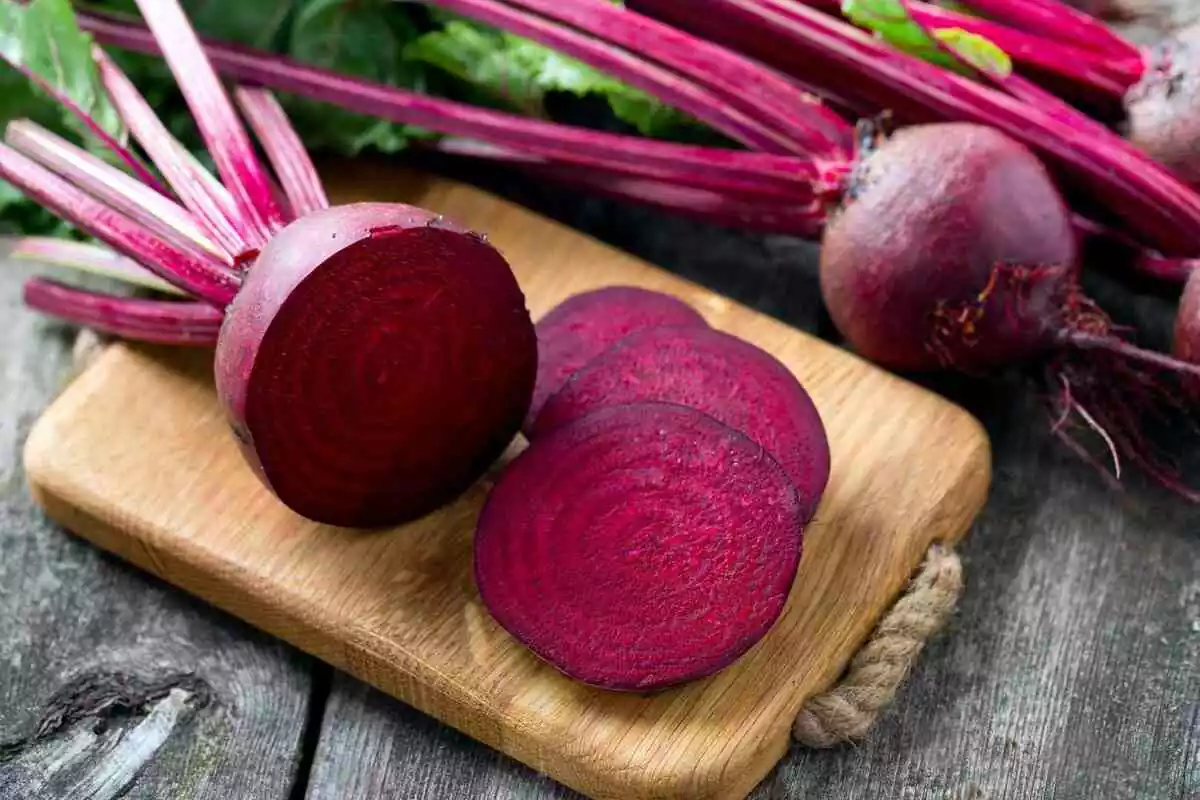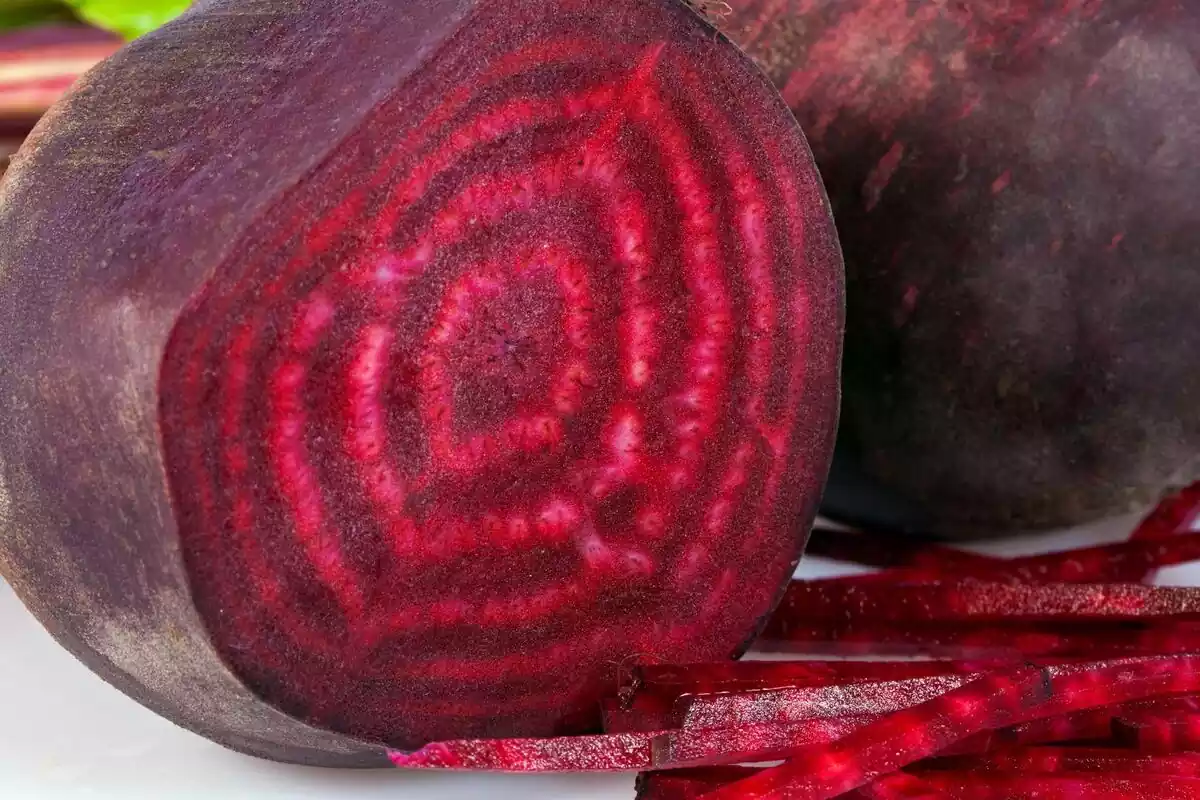Beets are not necessarily one of the most popular foods out there, but these vegetables sure are packed with a wide range of remarkable health benefits. Besides, they are delicious, versatile, and easy to incorporate in a healthy and balanced diet.
This low calorie, high fiber veggie is known to lower blood pressure, in addition to many other benefits. To find out more, in this article, we analyze what beets are, their potential health benefits, and homemade recipes to make adding this food to your diet easy.
What are beets?
Beets are tubers known for their striking magenta color and culinary versatility.
Usually, the root of this plant is the part that is used in recipes like creamy soups, gazpacho, or even roasted and is typically a side served with the main dish. However, the leaves are also edible and can add a distinctive flavor to different meals.
These purple roots can be boiled, roasted, pickled, or eaten raw; on their own or with other veggies, or even with meat. Pickled beets are very popular and are made by putting this tuber in vinegar. As far as the leaves, the most tender parts are usually used in salads, while others that are harder can be boiled or steamed.
In addition to its regular consumption, this root is also used as a natural food coloring and a medicinal plant. The fact that this vegetable is rich in vitamins, minerals, and essential plant nutrients makes it highly beneficial to the health, which is why it is said to have special properties.
Natural remedies and mixtures to treat digestion and blood-related health conditions have been made from this root since the Middle Ages.
Health benefits
Both the roots and leaves of this plan are chock-full of highly nutritious vitamins and minerals whose properties can do wonders for the human body.
Below, we list 7 health benefits of beets that are scientifically proven.
1. Nutrient rich and low in calories
Beets are known for being highly nutritious. This vegetable is low calorie and contains lots of vitamins and minerals, and has almost all of the nutrients that our body needs.
A 100 gram serving of this cooked vegetable contains the following vitamins and nutrients:
Calories: 44 kcal
Fats: 0.2 g
Fiber: 2 g
Protein: 1.7 g
Vitamin C
Vitamin B6
Magnesium
Folate
Potassium
Phosphorus
Manganese
Iron
2. Regulate blood pressure
According to scientific research, beets can lower blood pressure significantly. This condition is one of the main risk factors for heart failure or even having a stroke.
This effect seems to be even more significant in systolic blood pressure, or the pressure that the heart puts on the blood vessels when it contracts. This food's high concentration of nitrates is responsible for this outcome.
Dietary nitrates become nitric oxide inside of the body -this a molecule that dilates the blood vessels and brings the blood pressure down.
3. Fight inflammation
Another one of beet's unique qualities is its high betalain content, which is what accounts for this vegetable's bright color. Pigments are currently being researched to see if they could possibly be anti-inflammatory agents.
Although most testing is done on animals for the time being, beet juice or extract seems to reduce kidney inflammation.
Another study performed on osteoarthritis patients proved that betalain capsules made with beetroot extract reduced the pain and discomfort associated with this health condition.
4. Improve physical performance
As stated previously, beets are an excellent source of nitrates. With this in mind, studies show that dietary nitrates have the potential to improve physical performance in high-intensity sports.
This improvement is the result of the positive effect that nitrates have on mitochondrial efficiency. These cell organelles are responsible for supplying the cells with the energy that they need for this kind of intense activity.
5. Improve digestive health
The dietary fiber in fruits and vegetables is an integral part of a healthy diet. Besides, this nutrient has many health benefits, including improving digestive health.
Beets are high in fiber, which is why increasing the amount of this nutrient in the diet can help to improve the digestive system's function and prevent afflictions like constipation, inflammatory bowel disease, and diverticulitis.
Besides, you can lower your risk of developing certain chronic diseases including colon cancer, heart disease, and type 2 diabetes by eating more fiber.
6. Aid in weight loss
Beets have many nutritional attributes that could aid in weight loss. It's no wonder this root can help people to achieve and maintain an ideal weight since this vegetable is low-calorie and has a high water and fiber content.
On the other hand, this root's fiber can also help with weight loss since it fills you up and makes you feel less hungry.
7. Promote brain health
Finally, there is research out there that shows how the nitrates in beets can improve cognitive function and dialate the blood vessels. Consequently, this improves the blood flow to the brain.
It's proven that nitrates can improve the delivery of blood and oxygen to the brain's frontal lobe. This area is explicitly associated with high-level cognitive function necessary for working memory and decision making.

Recipes: Hummus and gazpacho
As we now know, beets can be prepared in a wide variety of ways. You can roast them, boil them, or even eat them raw in salads. Besides, this ingredient could give creamy soups, gazpacho, or pickled foods an extra special flair.
This veggie is so versatile, and its beautiful color is a great way to make any dish more exciting. All of this is a great excuse to start adding this root to your meals so that you can make the most of its nutritional benefits.
Below, you'll find two simple recipes using fresh ingredients: hummus with goat cheese and gazpacho.
1. Beet hummus and goat cheese
To make a delicious goat cheese hummus, you'll need the following ingredients:
1 large beet
1 can of cooked chickpeas
Juice of two lemons
¼ cup tahini
1 teaspoon salt
4 servings of crumbled goat cheese
¼ cup olive oil
To start, clean the beet and cut it into medium-large cubes. Place the cubes on a tray and bake them at 200º C for 25-30 minutes. When they are tender enough to pierce with a fork, easily, they're done. Let them cool.
Once cool, mix the beetroot with the chickpeas, lemon juice, tahini, salt, and goat cheese. Stir until the ingredients are well mixed and then add the olive oil.
Then, put the ingredients into a food processor until you achieve a smooth texture. Finally, put a few small cubes of goat cheese on top for an excellent presentation.
2. Beet Gazpacho
This tuber is an ideal ingredient in creamy soups and gazpachos, which is why we're going to tell you how to make a tasty homemade gazpacho with this ingredient. You'll need:
4 medium-sized beets
¼ cup finely chopped red onion
2 cloves of garlic
3 cucumbers peeled and cut
Fresh dill chopped
2 tablespoons sherry vinegar
½ teaspoon salt
¼ teaspoon black pepper
Start by putting the beets in a medium sized pot and covering them with water. Bring the water to a boil, and then turn down to low heat for 45-60 minutes. You'll know they're ready when you can stab them with a fork easily. Once cooked, let the broth and vegetables cool.
Once cool, remove the skin, cut them, and place 3 out of the 4 beets in the food processor with 2 cups of the broth. Add half of the chopped onion, garlic, 2 cucumbers, salt, pepper, vinegar, and dill.
Blend until the gazpacho has an even creamy texture. Then, place the mixture in the refrigerator until it's ready to serve.
Finally, with the leftover ingredients, you can prepare the garnish. Cut the beet and cucumber into small cubes and chop up the leftover dill. You can put this garnish on top of the gazpacho when you serve it.
References
Hobbs, D. A., Kaffa, N., George, T. W., Methven, L. & Lovegrove, J. A. (2012). Blood pressure-lowering effects of beetroot juice and novel beetroot-enriched bread products in normotensive male subjects. British Journal of Nutrition, 108(11): 2066–2074.
McMahon, N. F., Leveritt, M. D. & Pavey, T. G. (2016). The Effect of Dietary Nitrate Supplementation on Endurance Exercise Performance in Healthy Adults: A Systematic Review and Meta-Analysis. Sports Medicine.
